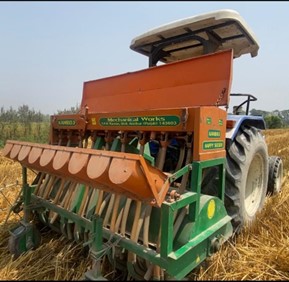Climate Action
BISA uses Climate-Smart Village approach to strengthen resilience in agriculture

BISA uses Climate-Smart Village approach to strengthen resilience in agriculture

- BISA farms are the best examples of large-scale demonstration of in-situ management of rice residue demonstrating ‘No Burning’ through appropriate use of Super SMS fitted combine harvesters and Happy Seeders.
- BISA hosts Climate Change Agriculture and Food Security (CCAFS) research program of the CGIAR, that envisages generation of innovative solutions to promote more adaptable and resilient agriculture and food systems; mainstream climate variability and climate change issues into development strategies and institutional agendas; enhance people’s understanding of climate change issues; and ensure that decisions on policies and actions are based on the best information and available data.
- In collaboration with national institutes, BISA is implementing a Climate Resilient Agriculture (CRA) program in Bihar which is financially supported by the Government of Bihar and the Ministry of Environment, Forests and Climate Change (MoEF&CC), Government of India.
- In the eastern Indo- Gangetic Plains, which is primarily a rice-wheat and rice maize cropping system, long-term field experiment has been established to develop resource-efficient and viable management options for resource-poor farmers.
- • BISA is attempting to alleviate the drudgeries of farmers especially women, through the popularization of small farm machineries in different Indian states, mainly Maharashtra, Bihar, and Madhya Pradesh.
- The Department of Biotechnology, Government of India, has recognized BISA as the leader of genomic selection in wheat in India.